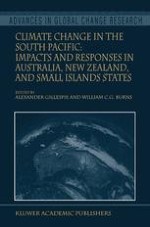2000 | OriginalPaper | Chapter
New Zealand Climate Policy Between 1990 and 1996: A Greenpeace Perspective
Author : Kirsty Hamilton
Published in: Climate Change in the South Pacific: Impacts and Responses in Australia, New Zealand, and Small Island States
Publisher: Springer Netherlands
Included in: Professional Book Archive
Activate our intelligent search to find suitable subject content or patents.
Select sections of text to find matching patents with Artificial Intelligence. powered by
Select sections of text to find additional relevant content using AI-assisted search. powered by
The unspoken tragedy of the United Nations Framework Convention on Climate Change’s (FCCC) Third Conference of the Parties (COP3) in Kyoto was the implications for the Pacific. The demands of New Zealand’s neighbouring nations, along with other small island states, for strong international reduction targets for C02 emissions were categorically disregarded in the thick of international realpolitik. This allowed New Zealand and Australia to walk away from Kyoto without any greenhouse gas reduction targets at all. Ironically, both countries in the early years of the decade had stated clearly, along with Pacific Island leaders at the South Pacific Forum, that climate change was the greatest threat to the South Pacific region.1 Seven years later, New Zealand and Australia agreed to do less than the United States, the 15 members of the European Union, 10 Central and Eastern European countries, Canada and Japan.
